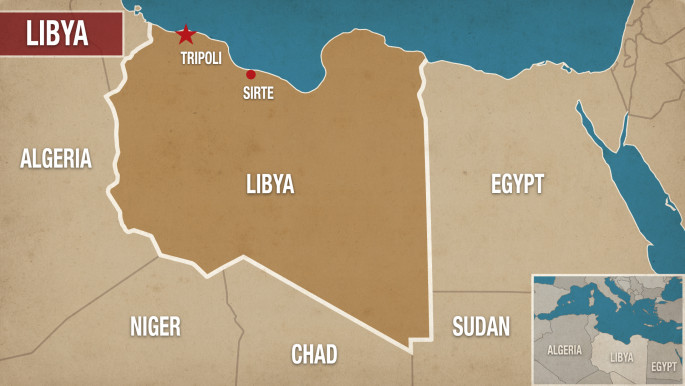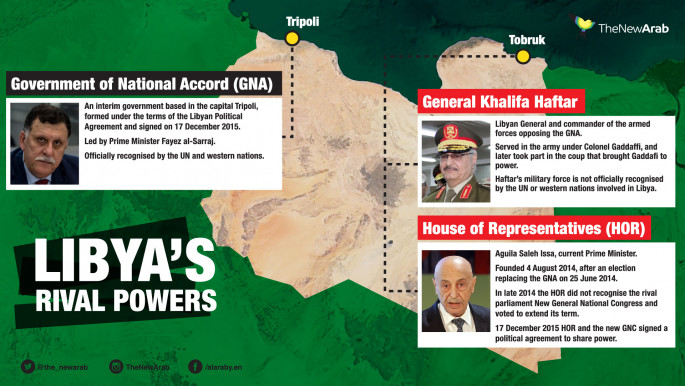What just happened in Libya?
Since moving to Tripoli last March, the UN-backed Government of National Accord or the GNA, has done little to prove it can secure the country to militia groups based in the west of Libya, and more importantly the Libyan people. Its predecessor the National Salvation Government and the General National Congress have never really left the city.
Mohamed Eljarh a non-resident fellow at the Atlantic Council told The New Arab “the GNC held meetings just two weeks ago, and are still making decisions in Tripoli.” In spite of numerous negotiations, hostility between the current and former governments came to a head on Friday night.
The so-called coup happened around the Rixos compound, made up of a hotel and various conference rooms. It seems the evacuation of the complex was caused by a dispute between one particular militia group and members of the UN-backed authorities.
During Muammar Gaddafi’s coup of 1969, the colonel and his loyalists captured the main radio stations of Tripoli and Benghazi, broadcasting news of the coup on the airwaves. The former Prime Minister Khalifa al-Ghwell only managed to broadcast his statement on private television station Tanasah, owned by the grand Mufti Sadek al-Ghariani.
He declared at a press conference that they were back in the building and in power again, he issued a “state of emergency”, and an “historical initiative to rescue Libya.” Soon afterwards, the GNA issued its own statement ordering the arrest of the coup leaders.
 |
|
| [Click to enlarge] |
Martin Kobler the head of the UN support mission in Libya or UNSMIL condemned what he called an attempt “to seize the headquarters of the high council of state. Such actions, aimed are creating parallel institutions and obstructing the implementation of the LPA will generate further disorder and insecurity, and must end for the sake of the Libyan people.”
The UN has tried to downplay what happened, which comes as no surprise. It took months of agonising discussions to broker a unity government. The West sees the GNA and Libya’s political agreement or LPA as the best chance for ending the chaos in Libya.
However, Mohamed Eljarh thinks the take over of the compound underscores the fragility of the situation in Tripoli. “It shows the limitations of a UN-backed government that can’t even secure its own building.”
What happens now depends on whether the GNC and the National Salvation Government want to become the dominant force on the ground. If they show that they are unwilling to give in again and step aside, then Eljarh believes that Prime Minister Fayez al Sarraj only has a few dire options available to him.
“Firstly he can resign, or disappear; the second option would be to fight, and the third would be to move the government to Tunis or elsewhere.” For now there is a standoff in Tripoli, and each side must assess which militias will remain loyal.
The coups and takeovers of power I have covered, from Central African Republic to Eastern Congo have taught me that loyalty can be bought. Typically, the tide turns in favour of the group or leader viewed as the strongman of the day.
In order to pay these gunmen, and manage the country, the GNA must take back control of the oil. According to Mattia Toaldo senior policy fellow at the European Council on Foreign Relations “without oil revenues there are no government revenues, and without those there are no salaries for about 80 percent of the workforce.”
Rival forces in Libya have been fighting over various oil ports in the last few months. Military strongman Khalifa Haftar recently took the so-called oil crescent, which is made up of the ports of Ras Lanuf, Al Sidra, Zuwaytina and Brega.
 |
|
| [Click to enlarge] |
To confuse matters even more the National Oil Corporation, which is now in charge of the ports, has split loyalties to the government in the East and to the GNA in the West. It says it will increase oil production, but the problem is that the revenues are unlikely to end up in the coffers of the central bank of Tripoli.
On his Twitter account, Jonathan Winer, the US envoy to Libya noted that the country needs oil revenues “to pay for imports – food, pharmaceuticals, gasoline, among other things.”
The UN recently launched an appeal to raise more than ten million dollars for what it called “life-saving emergency assistance for close to 80,000 people,” in and around the city of Sirte where fighting with the Islamic State group (IS) has caused a humanitarian crisis.
The GNA has strong backing from Washington, London and Brussels. The European Union is supposed to begin training Libya’s coastguard to prevent more migration across the Mediterranean.
However, its inability to gain a foothold in Tripoli and assert itself over Haftar and his allies in the East has weakened its status. Many Libyans regard it as ineffectual.
In the coming weeks it will need to reassert its authority, if it doesn’t want this so-called attempted coup to become a real and permanent take over.





 Follow the Middle East's top stories in English at The New Arab on Google News
Follow the Middle East's top stories in English at The New Arab on Google News


